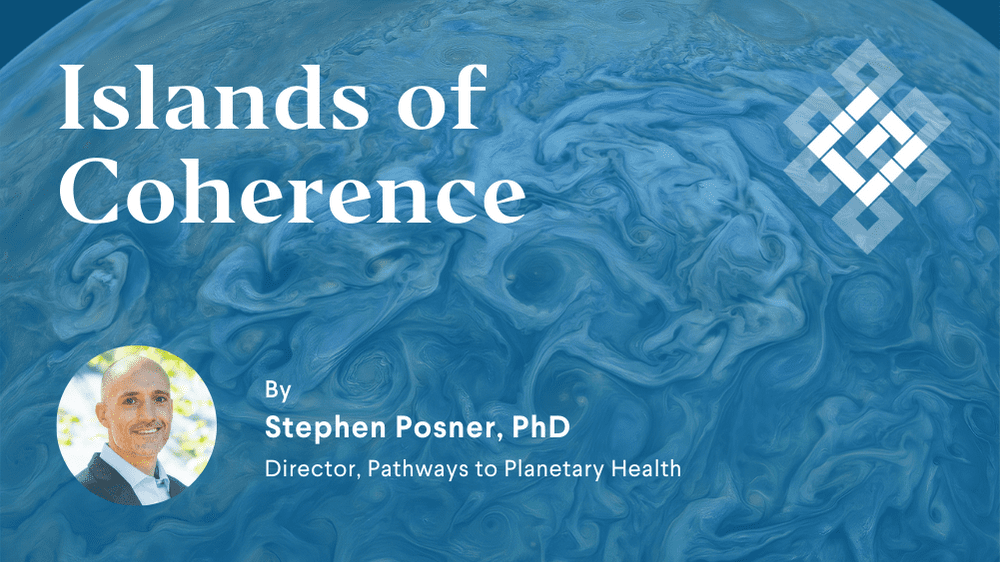Islands of Coherence
“When a complex system is far from equilibrium, small islands of coherence in a sea of chaos have the capacity to shift the entire system to a higher order.”
Ilya Prigogine, Nobel Prize-winning chemist
From March 15 to 17, 2023, a group of about 80 leaders gathered at the Garrison Institute for a Pathways to Planetary Health Symposium focused on the commons.
Systems change was a recurrent theme at this meeting. One participant mentioned Ilya Prigogine’s quote above about “islands of coherence” as a way to think about shifting social systems from being hyper-individual to more relational and reciprocal.
The concept resonated with many attendees and inspired new ideas about systems change and the commons. I’ve been reflecting on what the concept means for planetary health and engaged contemplation.

Participants connecting at the 2023 Pathways to Planetary Health Symposium.
Drifting into View
Islands of coherence sit within the context of a sea of chaos. In my view, a “sea of chaos” looks like a vast surface of disordered confusion. Turbulence. Conflict. We don’t need to immediately evaluate it as good or bad. Chaos happens.
Within this sea of chaos, small pockets of coherence form. Discernible areas of “joined-up-edness,” like waves on the ocean that align to form a unified whole, empty of a separate self. These emergent islands of coherence drift into view out of a sea of chaos. They are beautiful structures that make sense.
Prigogine proposed that small islands of coherence can shift an entire system to become more coherent. Systems change all the time, but they don’t always undergo deep, transformative shifts. It’s compelling to think that small, seemingly isolated, and discrete areas of coherence can inspire clarity across a whole social system and shift it to a higher order.*

Jupiter composite image. NASA / SwRI / MSSS / Gerald Eichstädt / Seán Doran © CC NC SA
Applying Islands of Coherence to Economic and Inner Systems
The Pathways to Planetary Health initiative focuses on regenerative economies as a foundational pathway because economic systems that assess and allocate value are often not aligned with nature. This imbalance can cause disruptive and degenerative patterns in society.
Many economic systems currently don’t make sense in the way they drive rampant, impractical patterns of consumption and production. Chaotic global markets are untethered by ethical foundations. And they foster a sense of hyper-individuality, fueling both real and perceived poly-crises and division.
Amidst this sea of chaos, there are pockets of new paradigms in coherent thought that can shift an entire economic system toward a phase that restores balance, regenerates communities, and replenishes places. There are examples of islands of coherence that promote fresh new purpose for economies, like well-being , justice, or social foundations and ecological ceilings.

Interestingly, when applied to inner dimensions, the “islands of coherence in a sea of chaos” concept still resonates. An unsettled or indecisive monkey mind, cravings and attachments, and the perception of separateness rather than interconnectedness can look like a sea of chaos. And yet, small islands of coherent clarity take shape. Coherent inner experience of the present moment emerges from a sea of chaos.
With contemplative practice, these islands have the capacity to shift the entire inner system towards more coherent balance.
Contemplating Worldviews
The Pathways to Planetary Health initiative is building from these insights to partner with the Nova Institute for Health and the Planetary Health Alliance to collaborate on the Constellation Project. Our goal is to create the conditions for people to contemplate worldviews and create new narratives. “Islands of coherence” is an example of a narrative that can help cultivate regenerative culture. Many others exist as well.
We can use concepts like “islands of coherence” to free our imaginations and examine our worldviews. New narratives shed light on the societal conditions for planetary health. They also help us envision a future where we all belong and bring us into more present relationship with ourselves, one another, and the rest of nature.
For example, the islands of coherence concept can allow us to appreciate diverse efforts as interconnected. If we dip below the surface of the sea, we see how seemingly separate islands are all connected. Literal islands in the ocean arise from the planet’s surface — islands covered in ice, desert, or lush tropical rainforest are all part of the same ground. Similarly, conceptual islands representing coherent areas of effort are interconnected.
Realizing the common ground among islands of coherence creates an opportunity to go beyond connecting. Connecting can be transactional and transient. Joining up in relativity and realizing ongoing relationship among parts of a whole can shift entire systems – inner and outer – from seemingly isolated and transitory islands towards more widespread coherent balance. This awareness of interconnection enables enduring coordination among islands of coherence.
Inviting Coherence
Prigogine’s quote has limitations. In my view, a system does not need to be far from equilibrium to undergo transformation. Small islands of coherence can inspire clarity without a system moving far into the realm of imbalance.
The Pathways initiative at the Garrison Institute is a place for exploring islands of coherence and creating conditions for inner and outer systems to become more regenerative and balanced. All are welcome, regardless of balance upon arrival.
* Judgment may arise from reading “higher order.” For me, this term can invoke a vertical hierarchy and imply value associated with relatively higher or lower positions. However, I believe that due to Prigogine’s works in physical chemistry and thermodynamics, his words about higher order refer simply to systems that are more highly ordered and less disordered (i.e. systems that have lower entropy).
***
Stephen Posner is the Garrison Institute’s Director of Pathways to Planetary Health. He has written about contemplative practice, environment, and the role of science in policy since 2007. To learn more about Stephen’s research publications, please click here.
